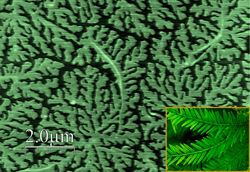
This strategy integrates all ICTP research lines and groups, ensuring that all scientific endeavours adopt sustainable approaches, and promoting an eco-design vision in research methodology and goals. Research no longer deals just with “What can we create?”, but also “How do we do it?”. This strategy seeks to conceive products that minimize environmental impacts, such as energy storage or decontaminants, while considering the entire life-cycle - from synthesis to disposal - of all polymers and materials developed at the ICTP. In the field of Polymer Science and Research, the application of Green Principles and Circular Approaches is very broad. This includes prioritizing renewable or abundant feedstocks, designing chemical synthesis to prevent waste, using or generating substances with minimal toxicity, and employing catalytic over stoichiometric reagents, preferably green catalysis (organocatalysts), to reduce energy, waste and time. The elimination of auxiliary components such as solvents, or replacing them with greener alternatives (water, ionic liquids, supercritical CO2, deep eutectic solvents) is another priority. The use of microwave chemistry, which results in time and energy savings, enables safer solvent or solvent-free process and catalysts. The use of recycled materials is also highly desirable. Particularly in the polymer field, conventional scalable polymer processing involving softening materials by heating does not use solvents, allows for the use of recycled materials (if thermoreversible) and consumes low energy, making it a sustainable option for obtaining new materials. New processing techniques, such as 3D printing, will reduce raw material consumption, optimize design and production processes, and promote local manufacturing.
To advance this strategy, new initiatives are being undertaken, such as the establishment of a Sustainability Committee, new internal research calls (detailed in the accompanying Excellence Plan), and the development of protocols to promote coherence and foster synergies among research groups. Sustainability assessments will be conducted by ICTP Advisory Boards in collaboration with stakeholders, including manufacturers.